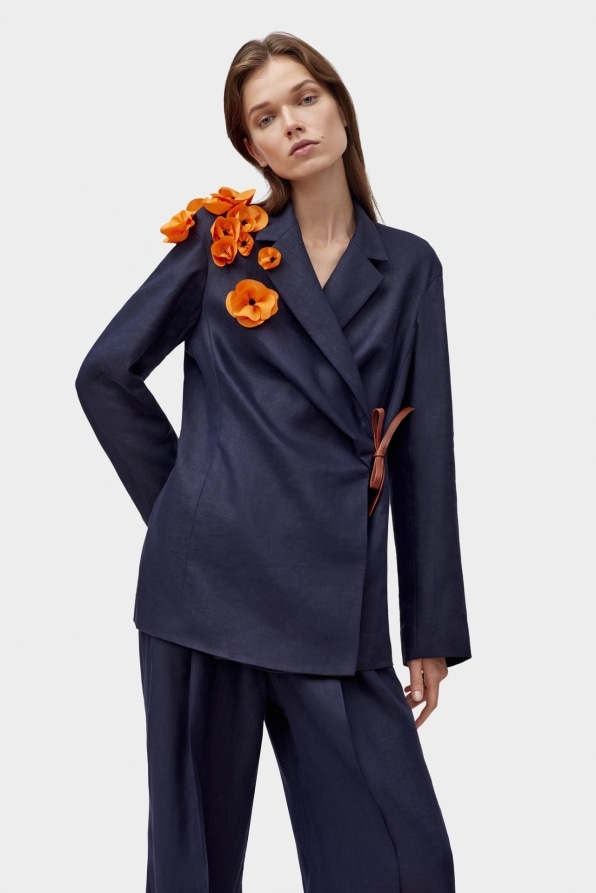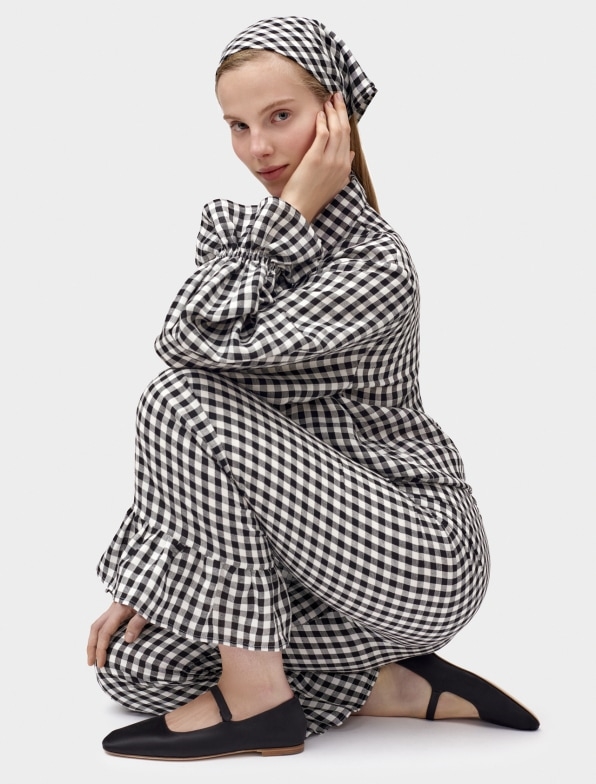Ukrainian fashion brand Sleeper is reopening its Kyiv atelier
In 2022, Ukrainian hit fashion brand Sleeper moved its entire supply chain abroad. Now, the brand is reopening its atelier in a changed Kyiv.
Celebrities from Kendall Jenner to Brie Larson have worn Sleeper party pajamas—matching sets festooned with feathers that can be worn both in bed and at a party. Though the company was founded in 2016 and had been steadily growing, sales exploded when COVID-19 hit and shoppers were searching for comfortable clothing that could also provide a touch of whimsy to liven up their time at home. The company turned into a social media sensation on Instagram and now sells its products on Net-A-Porter, at Bloomingdales, and other major retailers.
What many customers did not pick up on was the “made in Ukraine” label stitched into every outfit. The country has a long history of textile and garment manufacturing, with brands including Zara, Marks and Spencer, and Hugo Boss working with manufacturers there to produce clothing. Sleeper cofounders Asya Varetsa and Kate Zubarieva, former fashion-magazine editors, started the company in Kyiv, and until February 2022, their headquarters and manufacturing operations were based there.
But like many Ukrainian businesses, the company was impacted by the war. According to the World Bank, Ukraine’s economy could shrink by 30% in a year due to the war. Despite the disruptive environment, Sleeper has managed to keep going.
Now, after moving more than half of its employees away from Kyiv and rebuilding their entire supply chain from scratch, Varetsa and Zubarieva are working to reopen Sleeper’s headquarters in the capital next month. In doing so, the company joins a burgeoning group of Ukrainian-based independent fashion and accessory brands that have taken advantage of the country’s preexisting manufacturing infrastructure and their ability to reach customers on Instagram to grow e-commerce businesses.
“There has been a big renaissance of Instagram brands in Ukraine,” Zubarieva says. “There’s a gazillion of them now; craftsmen and manufacturers are working to make products for these companies.” Some examples she cites include Gunia, Ksenia Schneider, Anton Belinskiy, and Better, as well Uli, a concept store that works with smaller businesses to sell their goods online.
Until the war hit in February 2022, Sleeper’s 120-strong workforce was based in the company’s airy three-story Kyiv office. Its manufacturers were housed in the same building. “When we had a problem or wanted a design change, we could literally go upstairs and talk to our manufacturers— everyone was really local,” Varetsa says.
Two months before the war began, the cofounders started to make contingency plans. They eventually moved roughly 40 employees to western Ukraine. Another 20 relocated to Bursa, Turkey, with the help of one of their fabric suppliers. Now, the company’s R&D department is based there. “Most of our employees are women—all their husbands and boyfriends became soldiers,” Zubarieva says of the adjustment. Sleeper also quickly established a flexible work schedule to accommodate workers in Kyiv dealing with unpredictable schedules and power outages, and hired a therapist that employees could reach 24/7.
The company still had to contend with shipping delays as it found new manufacturers and suppliers. Its bottom line took a hit, even though most big buyers they worked with were willing to keep their commitments with the brand despite delays. The change meant that although Sleeper is profitable, the company’s financial cushion collapsed. Zubarieva and Varetsa, who started the company with a $2,000 gift from their grandmothers, hadn’t raised money or taken on capital from outside investors. Because of that, Varetsa says the cofounders focused their efforts on stabilizing the business rather than growing it over the past year.

Next month, the brand will reopen their Kyiv headquarters. The cofounders plan to use the space to house its customer support and finance teams. Zubarieva says, “60% of our employees are still in Ukraine. We want to give them some kind of continuity and for it to feel like normal life.”
The third floor will house an atelier that will create limited edition, one-of-a-kind designs, and all proceeds from those items will go to a fund supporting Ukrainian women and children. Zubarieva says that the company chose to create smaller collections there because exporting goods abroad from the country is still difficult. “Eventually we want to make more there and operate the way we did before.”
Like their employees, the cofounders are still deciding whether to return to Ukraine. Varetsa moved to Copenhagen and plans on staying there, though she will return to Ukraine for her wedding. “I got engaged to my husband before the war, and we were planning a wedding in Ukraine. I’m determined to have it when the war is over.” Zubarieva, on the other hand, who has made Berlin her home base, plans on going back for good once travel conditions improve. “I have to travel a lot for work—to manufacturers and partners—and right now, it’s difficult to go in and out of Ukraine. As soon as it’s easier, I’m moving back. It’s my home. My family is there. Plus, I have a beautiful apartment and it’s sitting empty, so I need to reopen that as well.”

At the beginning of the war, though they were no longer working with local manufacturers, Zubarieva and Varetsa continued to pay them for some time. Those same manufacturers were further hit when Zara owner Inditex moved its operations out of the country due to the volatile political situation. But a year later, those Ukrainian factories are busy again.
Zubarieva is hopeful for the end of the war, and with it, a Ukrainian fashion renaissance. “I think Kyiv will become a new center for smaller, independent brands,” she says. “Ukraine could become known for that.”
(6)



